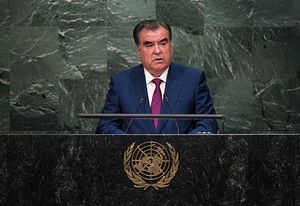According to Tajikistan President Emomali Rahmon, international “evil plans” are a greater threat to Tajikistan’s well-being than decimated remittance rates or the country’s cratering currency. Indeed, if you listened to Rahmon’s address to parliament earlier this week, you may well come away with the impression that Tajikistan’s fiscal footing – on the backs of Rahmon’s claims of strong GDP growth, decreasing poverty rates, and increased stipends – remains firm. And if you ignore the fact that, as EurasiaNet wrote, some of Rahmon’s economic claims were “embellished, not to speak of outright wrong,” the fiscal outlook, in Rahmon’s view, remains bright.
But according to the president – who was recently named the “Leader of the Nation” and “Founder of Peace and Accord” – external forces are still bent on ruining Tajikistan’s otherwise healthy future. As Rahmon railed, “there are certain countries and forces abroad that have not abandoned their malicious intentions against the Tajik people and hoped to realize their evil plans using traitors of the nation.”
Specifically, Rahmon cited the “September events” as evidence of this apparent external evil. September’s quasi-mutiny, quasi-coup, led by former Deputy Defense Minister Abduhalim Nazarzoda and leaving dozens dead, continues to shake Dushanbe, four months on. And rather than citing any possible domestic factors, Rahmon instead continues to externalize the motivations for the September unrest. As Rahmon continued, “these events have shown that there are still certain states and forces that are going to implement their evil plans through their associates and distribute alien ideas among the population.”
The most intriguing bits of Rahmon’s conspiracies have less to do with the fact that they exist, and more to do with the fact that he believes “certain states” are set on imploding Tajikistan’s stability. Rahmon didn’t name any countries outright, but immediate suspicion would fall on Uzbekistan, which has already threatened war over Tajikistan’s proposed hydropower expansion, and which maintains a heavily mined border with Tajikistan. Rahmon may have also been alluding, for some reason, to the United States and Western nations, which he slammed for “double standards” in terms of meddling in Muslim-majority nations.
Whichever the countries he had in mind, this isn’t the first time Rahmon has claimed the motivations surrounding the September assaults are “evil.” In the assault’s immediate fallout, Rahmon said those backing anti-government forces had “evil consciences” while pursuing “the same goals as Islamic State.” However, Rahmon did reveal this week that Nazarzoda, “over all these years, … [had] been cherishing secret plans and waiting for an opportunity to stage anti-government actions aiming to destabilize the situation in the country.” Rahmon didn’t explain why pro-government forces were apparently unable to ferret out Nazarzoda’s true leanings, if he’d been set on toppling the government for years.
If nothing else, the rhetoric is but the latest round of evidence that Rahmon would prefer to cloak his presidency’s missteps in external interference, rather than any domestic slips. Smacking of a Soviet – or Putinist – model, and coming in light of a Tajikistan official’s admission that tens of thousands of citizens have now undergone forced beard-shaving, Dushanbe’s lurch into full-throated autocracy shows no signs of slowing, no matter how many “evil plans” may exist.
































